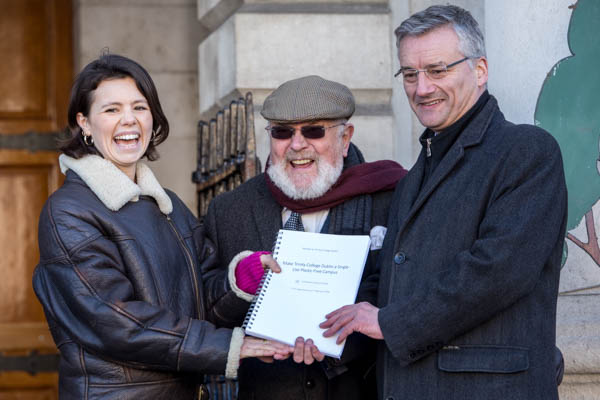Trinity is dabbling with democracy, in a bid to give students and staff a say in the new plastic-free policies the College has committed to.
Over the course of this week, students and staff will be asked what Trinity should prioritise as it aims to become plastic-free. The choices are simple: replace disposable glasses with reusable ones in the Buttery, abolish all plastic cutlery from the Buttery or introduce paper straws in the Pav.
On a newly launched website, anyone from the College community is asked to cast their vote. Speaking to The University Times, Michelle Hallahan, the Provost’s Sustainability Advisor, said the new system was simply about getting people’s opinions and views.
College “wants to know if we’re doing something people don’t want”.
This week’s trial is the culmination of eight months of work with company One Step Closer. Founded by Trinity graduate Joanna Mulkeen, the company aims to connect institutions and their members.
Speaking to The University Times, Mulkeen said: “Brands are very curious and very keen to listen more.”
The technology doesn’t necessarily need to be used on an entire campus population. Sub-groups, based on age, experiences and jobs, can also be surveyed.
Mulkeen stressed the importance of empowering a community by giving them a voice in the decisions that matter to them.
Tomorrow, the link to the voting form will be sent to all students and staff, with hopes that five to 10 per cent of the campus population will engage. For Mulkeen, this is one of the biggest projects her company has undertaken.
Provost Patrick Prendergast has, during his tenure, proved himself remarkably open to lobbying on environmental issues. Fossil Free TCD, which successfully pushed Trinity to divest from €6.1 million in fossil fuels, found a College more receptive than many other universities around the world that have faced similar campaigns, while Plastic-Free TCD, which began this year, quickly received support from Prendergast. Hallahan said Prendergast has been supportive of the project from the start.
However, if successful, the approach won’t simply be confined to environmental or sustainability issues. “It’s easy to feel disenfranchised and disempowered”, Hallahan says. The new project is asking people to consciously make a difference, whether that’s simply by casting a vote or getting more informed on an issue.
For the company or institution, the benefits are obvious: it can promote the work it’s doing, while also offering its employees, students or members the chance to feel like they’re making a difference.
Such a system, Hallahan says, is “more democratic and offers people the opportunity to be more informed about something that is important”. This first phase of the project, she hopes, will engage people – plastic reduction is an issue that has gained significant momentum in recent months and one she hopes people will be interested enough in to cast a vote.
If embraced, the system might reduce criticism of a College senior management often accused of a high-handed approach to policy-making. Coming only weeks after campus was rocked by protests over supplemental exam fees – itself a self-induced embarrassment following a failure to listen to students – Hallahan suggests that such an online polling system could be used in the future for similarly contentious decisions.
It remains to be seen if the trial will be a success, but the hopes are high that a little bit of democracy can make a difference in a university community. “It might seem simple, but it has a very big impact”, Mulkeen said.







